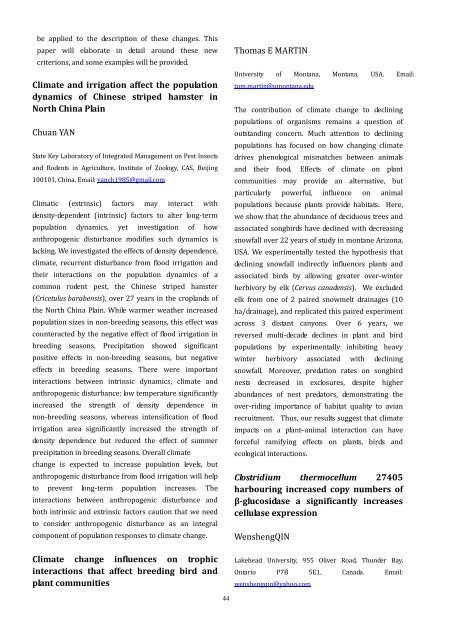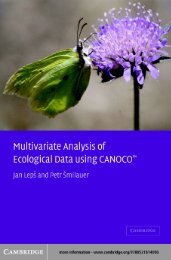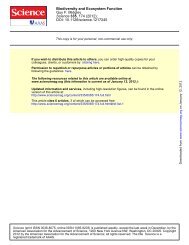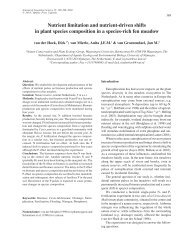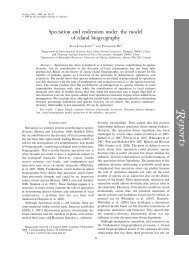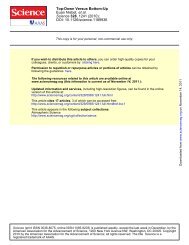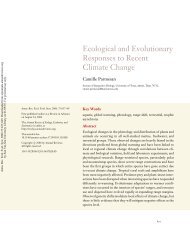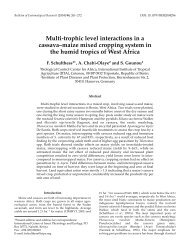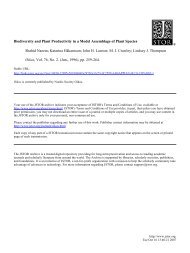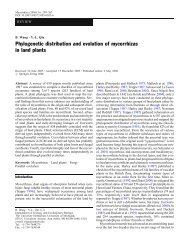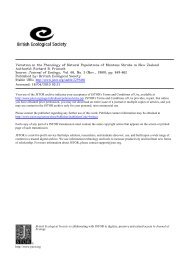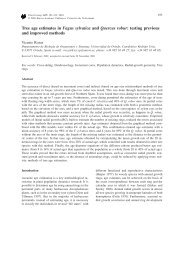Welcome to the 31st IUBS General Assembly and Conference on ...
Welcome to the 31st IUBS General Assembly and Conference on ...
Welcome to the 31st IUBS General Assembly and Conference on ...
Create successful ePaper yourself
Turn your PDF publications into a flip-book with our unique Google optimized e-Paper software.
e applied <str<strong>on</strong>g>to</str<strong>on</strong>g> <str<strong>on</strong>g>the</str<strong>on</strong>g> descripti<strong>on</strong> of <str<strong>on</strong>g>the</str<strong>on</strong>g>se changes. This<br />
paper will elaborate in detail around <str<strong>on</strong>g>the</str<strong>on</strong>g>se new<br />
criteri<strong>on</strong>s, <str<strong>on</strong>g>and</str<strong>on</strong>g> some examples will be provided.<br />
Climate <str<strong>on</strong>g>and</str<strong>on</strong>g> irrigati<strong>on</strong> affect <str<strong>on</strong>g>the</str<strong>on</strong>g> populati<strong>on</strong><br />
dynamics of Chinese striped hamster in<br />
North China Plain<br />
Chuan YAN<br />
State Key Labora<str<strong>on</strong>g>to</str<strong>on</strong>g>ry of Integrated Management <strong>on</strong> Pest Insects<br />
<str<strong>on</strong>g>and</str<strong>on</strong>g> Rodents in Agriculture, Institute of Zoology, CAS, Beijing<br />
100101, China. Email: yanch1985@gmail.com<br />
Climatic (extrinsic) fac<str<strong>on</strong>g>to</str<strong>on</strong>g>rs may interact with<br />
density‐dependent (intrinsic) fac<str<strong>on</strong>g>to</str<strong>on</strong>g>rs <str<strong>on</strong>g>to</str<strong>on</strong>g> alter l<strong>on</strong>g‐term<br />
populati<strong>on</strong> dynamics, yet investigati<strong>on</strong> of how<br />
anthropogenic disturbance modifies such dynamics is<br />
lacking. We investigated <str<strong>on</strong>g>the</str<strong>on</strong>g> effects of density dependence,<br />
climate, recurrent disturbance from flood irrigati<strong>on</strong> <str<strong>on</strong>g>and</str<strong>on</strong>g><br />
<str<strong>on</strong>g>the</str<strong>on</strong>g>ir interacti<strong>on</strong>s <strong>on</strong> <str<strong>on</strong>g>the</str<strong>on</strong>g> populati<strong>on</strong> dynamics of a<br />
comm<strong>on</strong> rodent pest, <str<strong>on</strong>g>the</str<strong>on</strong>g> Chinese striped hamster<br />
(Cricetulus barabensis), over 27 years in <str<strong>on</strong>g>the</str<strong>on</strong>g> cropl<str<strong>on</strong>g>and</str<strong>on</strong>g>s of<br />
<str<strong>on</strong>g>the</str<strong>on</strong>g> North China Plain. While warmer wea<str<strong>on</strong>g>the</str<strong>on</strong>g>r increased<br />
populati<strong>on</strong> sizes in n<strong>on</strong>‐breeding seas<strong>on</strong>s, this effect was<br />
counteracted by <str<strong>on</strong>g>the</str<strong>on</strong>g> negative effect of flood irrigati<strong>on</strong> in<br />
breeding seas<strong>on</strong>s. Precipitati<strong>on</strong> showed significant<br />
positive effects in n<strong>on</strong>‐breeding seas<strong>on</strong>s, but negative<br />
effects in breeding seas<strong>on</strong>s. There were important<br />
interacti<strong>on</strong>s between intrinsic dynamics, climate <str<strong>on</strong>g>and</str<strong>on</strong>g><br />
anthropogenic disturbance: low temperature significantly<br />
increased <str<strong>on</strong>g>the</str<strong>on</strong>g> strength of density dependence in<br />
n<strong>on</strong>‐breeding seas<strong>on</strong>s, whereas intensificati<strong>on</strong> of flood<br />
irrigati<strong>on</strong> area significantly increased <str<strong>on</strong>g>the</str<strong>on</strong>g> strength of<br />
density dependence but reduced <str<strong>on</strong>g>the</str<strong>on</strong>g> effect of summer<br />
precipitati<strong>on</strong> in breeding seas<strong>on</strong>s. Overall climate<br />
change is expected <str<strong>on</strong>g>to</str<strong>on</strong>g> increase populati<strong>on</strong> levels, but<br />
anthropogenic disturbance from flood irrigati<strong>on</strong> will help<br />
<str<strong>on</strong>g>to</str<strong>on</strong>g> prevent l<strong>on</strong>g‐term populati<strong>on</strong> increases. The<br />
interacti<strong>on</strong>s between anthropogenic disturbance <str<strong>on</strong>g>and</str<strong>on</strong>g><br />
both intrinsic <str<strong>on</strong>g>and</str<strong>on</strong>g> extrinsic fac<str<strong>on</strong>g>to</str<strong>on</strong>g>rs cauti<strong>on</strong> that we need<br />
<str<strong>on</strong>g>to</str<strong>on</strong>g> c<strong>on</strong>sider anthropogenic disturbance as an integral<br />
comp<strong>on</strong>ent of populati<strong>on</strong> resp<strong>on</strong>ses <str<strong>on</strong>g>to</str<strong>on</strong>g> climate change.<br />
Climate change influences <strong>on</strong> trophic<br />
interacti<strong>on</strong>s that affect breeding bird <str<strong>on</strong>g>and</str<strong>on</strong>g><br />
plant communities<br />
Thomas E MARTIN<br />
University of M<strong>on</strong>tana, M<strong>on</strong>tana, USA. Email:<br />
<str<strong>on</strong>g>to</str<strong>on</strong>g>m.martin@um<strong>on</strong>tana.edu<br />
The c<strong>on</strong>tributi<strong>on</strong> of climate change <str<strong>on</strong>g>to</str<strong>on</strong>g> declining<br />
populati<strong>on</strong>s of organisms remains a questi<strong>on</strong> of<br />
outst<str<strong>on</strong>g>and</str<strong>on</strong>g>ing c<strong>on</strong>cern. Much attenti<strong>on</strong> <str<strong>on</strong>g>to</str<strong>on</strong>g> declining<br />
populati<strong>on</strong>s has focused <strong>on</strong> how changing climate<br />
drives phenological mismatches between animals<br />
<str<strong>on</strong>g>and</str<strong>on</strong>g> <str<strong>on</strong>g>the</str<strong>on</strong>g>ir food. Effects of climate <strong>on</strong> plant<br />
communities may provide an alternative, but<br />
particularly powerful, influence <strong>on</strong> animal<br />
populati<strong>on</strong>s because plants provide habitats. Here,<br />
we show that <str<strong>on</strong>g>the</str<strong>on</strong>g> abundance of deciduous trees <str<strong>on</strong>g>and</str<strong>on</strong>g><br />
associated s<strong>on</strong>gbirds have declined with decreasing<br />
snowfall over 22 years of study in m<strong>on</strong>tane Ariz<strong>on</strong>a,<br />
USA. We experimentally tested <str<strong>on</strong>g>the</str<strong>on</strong>g> hypo<str<strong>on</strong>g>the</str<strong>on</strong>g>sis that<br />
declining snowfall indirectly influences plants <str<strong>on</strong>g>and</str<strong>on</strong>g><br />
associated birds by allowing greater over‐winter<br />
herbivory by elk (Cervus canadensis). We excluded<br />
elk from <strong>on</strong>e of 2 paired snowmelt drainages (10<br />
ha/drainage), <str<strong>on</strong>g>and</str<strong>on</strong>g> replicated this paired experiment<br />
across 3 distant cany<strong>on</strong>s. Over 6 years, we<br />
reversed multi‐decade declines in plant <str<strong>on</strong>g>and</str<strong>on</strong>g> bird<br />
populati<strong>on</strong>s by experimentally inhibiting heavy<br />
winter herbivory associated with declining<br />
snowfall. Moreover, predati<strong>on</strong> rates <strong>on</strong> s<strong>on</strong>gbird<br />
nests decreased in exclosures, despite higher<br />
abundances of nest preda<str<strong>on</strong>g>to</str<strong>on</strong>g>rs, dem<strong>on</strong>strating <str<strong>on</strong>g>the</str<strong>on</strong>g><br />
over‐riding importance of habitat quality <str<strong>on</strong>g>to</str<strong>on</strong>g> avian<br />
recruitment. Thus, our results suggest that climate<br />
impacts <strong>on</strong> a plant–animal interacti<strong>on</strong> can have<br />
forceful ramifying effects <strong>on</strong> plants, birds <str<strong>on</strong>g>and</str<strong>on</strong>g><br />
ecological interacti<strong>on</strong>s.<br />
Clostridium <str<strong>on</strong>g>the</str<strong>on</strong>g>rmocellum 27405<br />
harbouring increased copy numbers of<br />
βglucosidase a significantly increases<br />
cellulase expressi<strong>on</strong><br />
WenshengQIN<br />
Lakehead University, 955 Oliver Road, Thunder Bay,<br />
Ontario P7B 5E1, Canada. Email:<br />
wenshengqin@yahoo.com<br />
44


